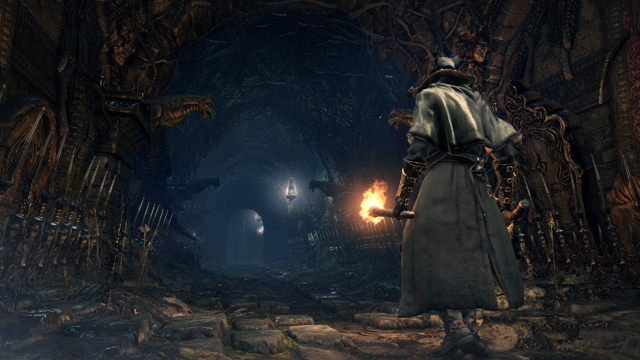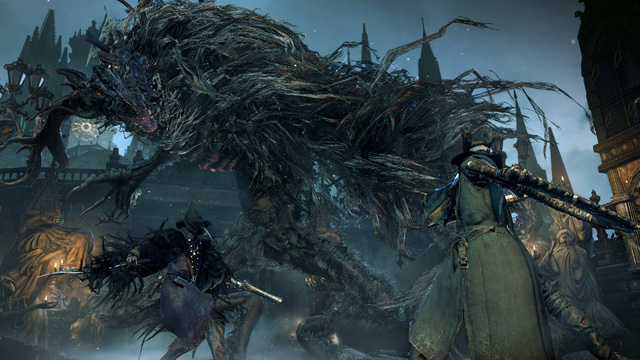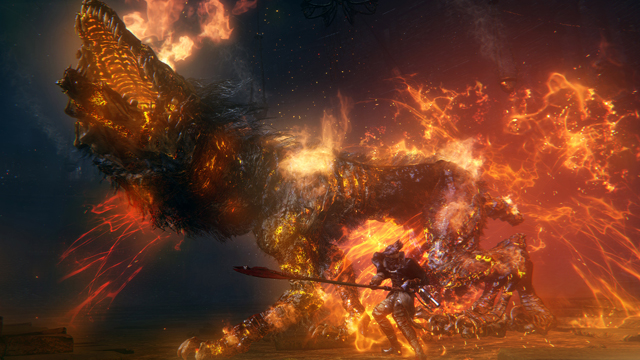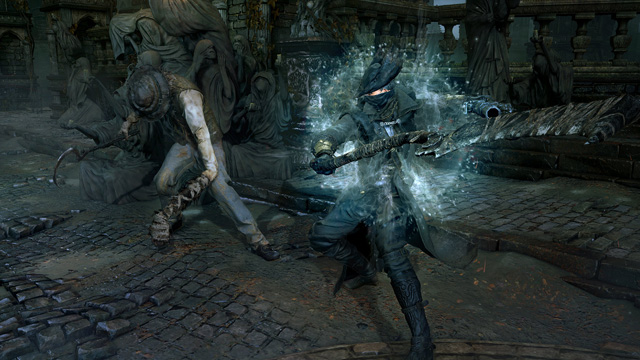
Let’s begin by stating the obvious: Bloodborne is a hard game. It is punishing, it is frustrating and it will cause you to angrily lash out at thin air. It will make you stare into a mirror for long periods of time, contemplating at exactly what point in your life you took a wrong turn. But the true brilliance of Bloodborne is that you will want to keep playing. You will get better, you will master its intricacies and, when things truly begin to click, you will be filled with a sense of pride and self-satisfaction that very few other games can match. Bloodborne boils down the essence of what made the previous Souls games great into a refined nugget of pure perfection. It is an experience that requires true commitment and devotion, but for those that put in the time and effort it is an experience that leaves a very long lasting and indeed a very powerful impact.
I don’t find games that are too difficult or overly frustrating fun in any way, so on paper I should hate this title. What is it, then, about Bloodborne that keeps me playing, and in fact inspires an almost feverish passion? Outside of the small niche of titles that From Software has created, there are almost no games that provide me the same satisfaction through gameplay. To succeed in Bloodborne you are required to learn, and when every death is approached as a learning opportunity, the frustration changes. An incident that in other titles would cause me to rip my hair out in anger instead becomes a situation in which I instantly ask myself what happened and why.
You are quickly able to see gains in knowledge through gameplay when you make it further and do better. The satisfaction you get from easily defeating early enemies later in the game is indescribable, because you aren’t just winning because your avatar has more stat points; you are winning because you are a better player.

The story and atmosphere of Bloodborne borrow heavily from H.P. Lovecraft and the Cthulhu mythos. The elements of mystery and of classic Victorian horror play especially well with this genre, and I actually enjoyed the aesthetic of Bloodborne much more than the dark fantasy settings of the Souls games. There is a story that the game tells, but it never takes center stage; it requires a lot of effort on the part of the player to delve into the mystery of the lore by reading through various item descriptions. The story is interesting and relatively accessible, but I wouldn’t consider it a compelling reason to play.
Bloodborne’s combat is the largest departure for fans of the Souls series. In those, being patient with a powerful shield is a very viable strategy. Brushing aside blows and waiting for the right moment to strike formed the basis of the combat loop that the previous games built upon. In Bloodborne, being passive will get you killed, and the only chance for success is to take risks and go on the offensive. Shields are gone (the one shield in the game is basically a joke), and through the introduction of the “regain” system, the reward for taking the initiative in combat becomes well worth it.
When you take damage, your life meter has a mark which shows your current lowered health, but the health bar doesn’t immediately drain. Instead, if you are able to quickly cause damage (to anything around you), you can cause your health to jump back to where it originally was. This system adds a ton of depth to the combat as it can just as easily force rash decisions that lead to death as often as it benefits the player for going for it. Identifying the times when striking to regain health before it’s lost is, like so many other skills in Bloodborne, one you learn through the gameplay itself.

The biggest issue with Bloodborne is undoubtedly the load times. For a game in which death and reloading is such a common occurrence, the long loads do become especially noticeable and frustrating. There is also the issue of having to leave the “game world” to head to a safe area where you can level up and purchase equipment, and this requires multiple loads before getting back into the game itself.
Alongside the load times, the game also has a minor grinding issue, especially with farmable materials like healing items and bullets. To succeed you’ll want a full stock of healing at all times, but this requires farming lower-level areas repeatedly to stock up. This does get monotonous, especially when the content is no longer challenging or providing of meaningful rewards beyond the items. These issues aren’t enough to detract from the overall experience, though, and hopefully some of them can be addressed through patches later in the game’s life.
The online component of Bloodborne is very intriguing, in much the same way it was in the Souls games. The two major multiplayer components involve physically entering someone else’s game and leaving notes for other players to view. By spending one of the collectible currencies, you can actually enter the world of another player for either competitive or cooperative play, and this works fairly well.

The more interesting aspect of the multiplayer is in the persistent online components with the note system. At any point you can leave a note in Bloodborne’s world for other players to read, and they in turn can rate your note as “fine” or “foul.” These notes can give clues to hidden items and paths, but they can also be completely in the opposite direction by giving terrible advice (“take a step forward!” followed by a cliff, for example, sometimes leads to great treasure, but sometimes leads directly to death). These notes add another layer to an already-complex game and give you the sense that you aren’t fighting alone, but instead have a whole community supporting you.
Bloodborne is amazing. I’ll admit, I come in with some Souls experience, but I’m still fairly bad at tough video games. Bloodborne simplifies the minutiae contained in the Souls experience but keeps the core things that make it great. It’s a game that I would urge everyone to try, even those that have been intimidated by these types of games in the past. When a game can be this addicting while simultaneously infuriating me as much as it does, it’s doing something right.
Pros: Methodical rewarding combat, expansive areas, challenging boss fights
Cons: Long load times, necessity to grind for materials



















